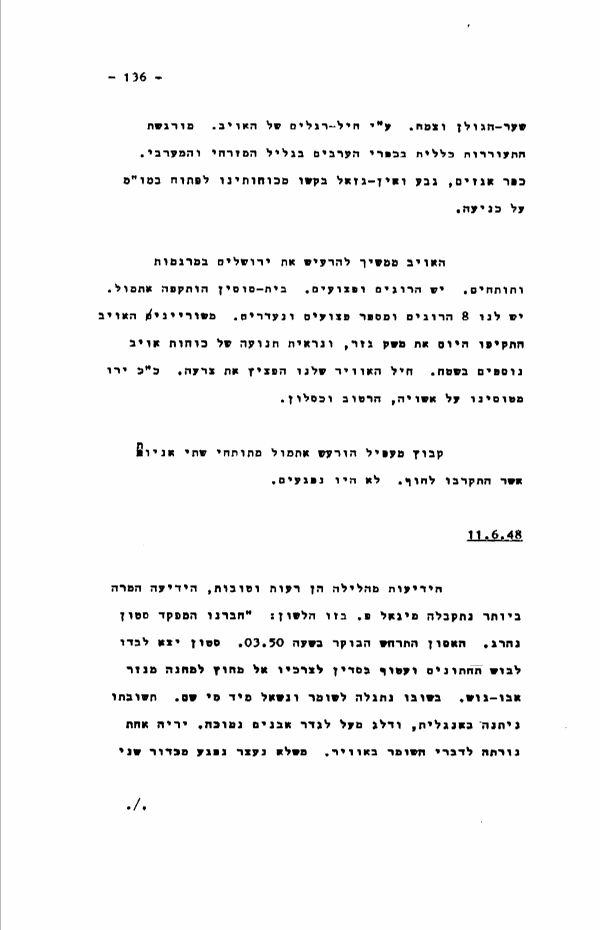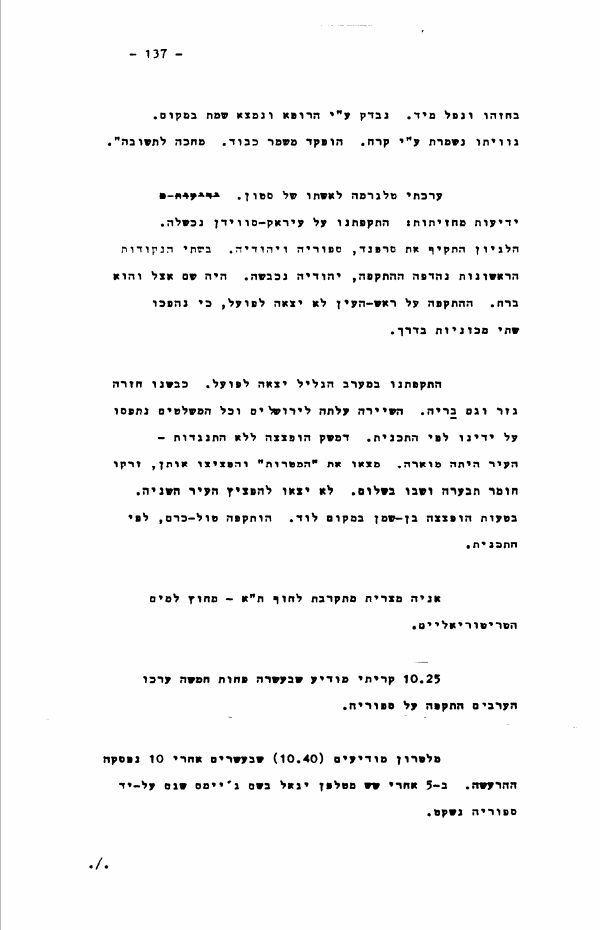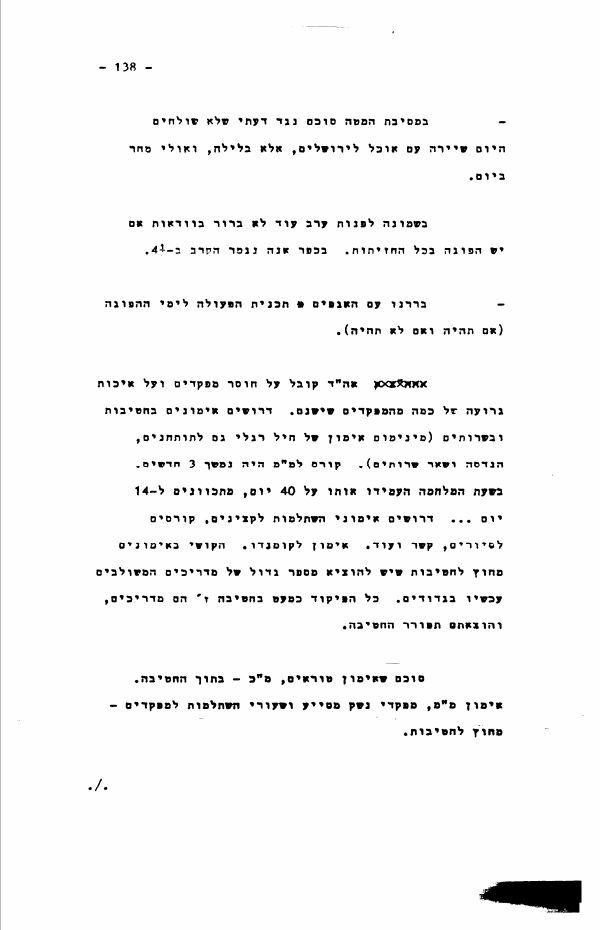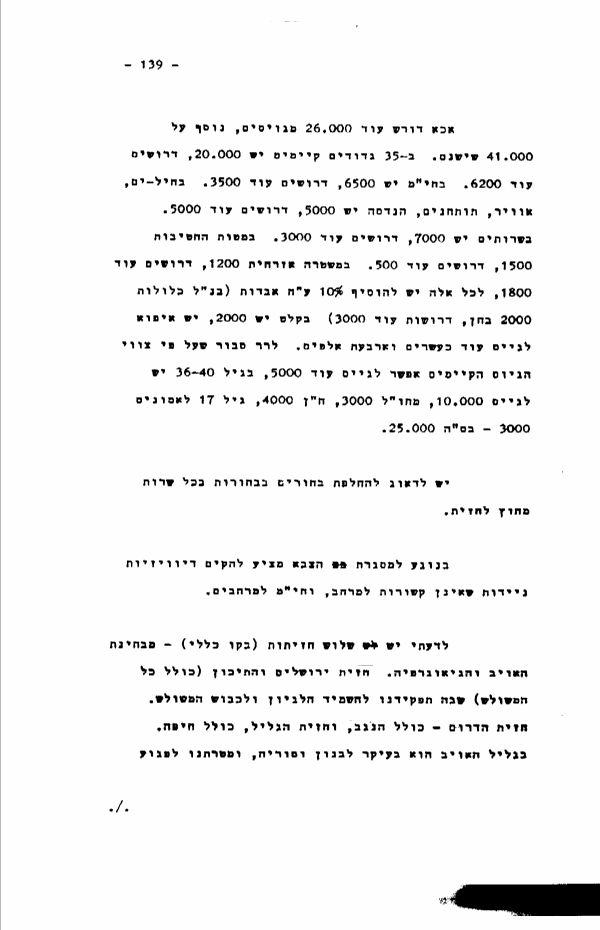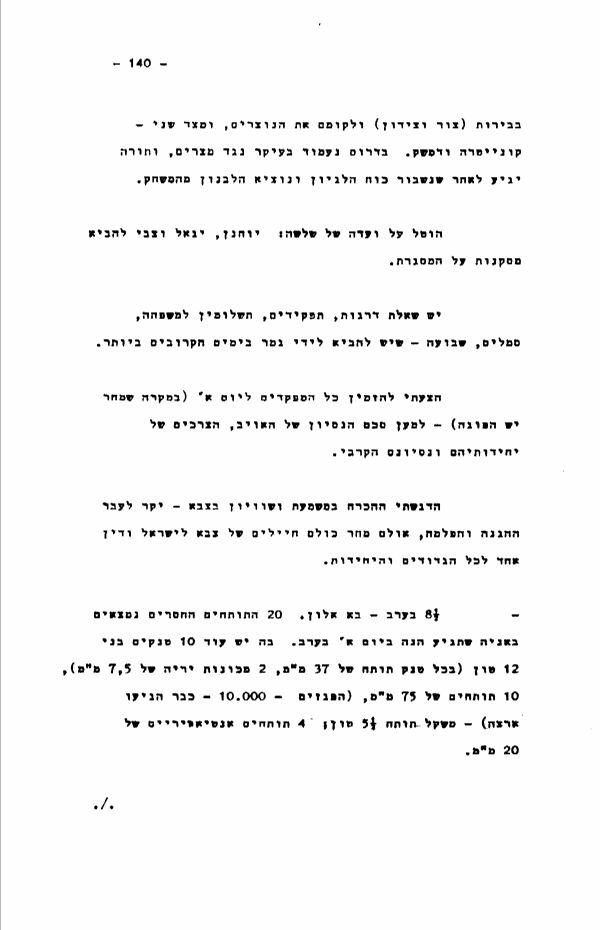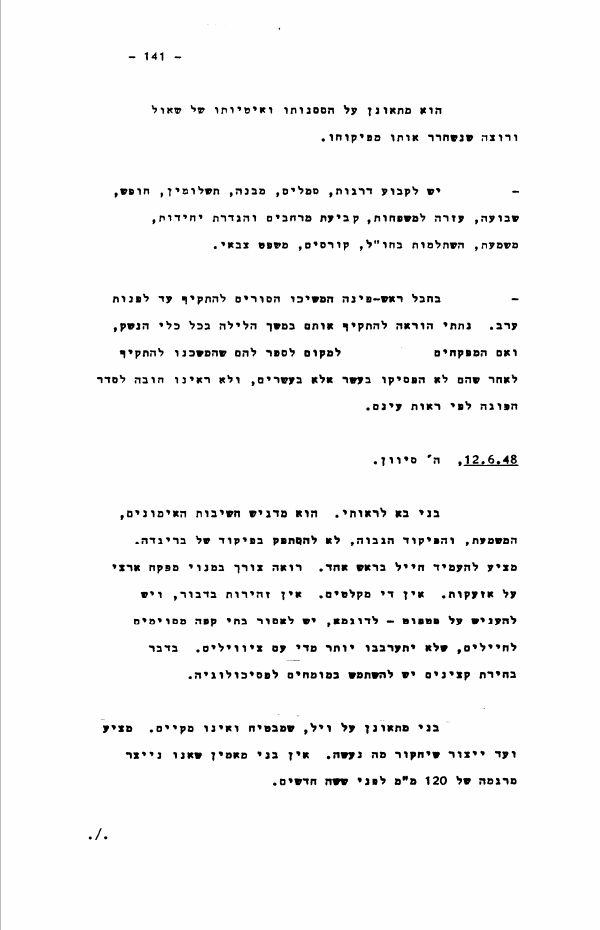[Friday,] June 11, 1948
The news tonight is good and bad. The worst news came from Yigal P. [Allon] in the following words: "Our friend Commander Stone [David Marcus] was killed. The tragedy occurred this morning at 03.50. Stone went out alone in his underwear and wrapped in a sheet to relieve himself outside the camp opposite Abu Ghosh. Upon his return, he was spotted by a guard and immediately asked who's there. His answer was given in English, and he skipped over a low stone fence. One shot was fired in the air, according to the guard. When he didn't stop, a second bullet hit him in the chest and he fell immediately. He was examined by a doctor and was found to have died on the spot. His body is being preserved on ice. An honor guard was assigned. Awaiting reply."
I prepared a telegram for Stone's wife.
News from fronts: Our attack against [the] Iraq-Suweidan [police] failed. The Legion attacked Sarafand, Safiriyya [today - Kefar Chabad], and Yehudiyya. At the first two sites, the attack was repulsed. Yehudiyya was conquered. The IZL was there and it fled. The attack [by the Alexandroni Brigade] on Rosh Ha'Ayin wasn't launched because two vehicles rolled over on the way there.
Our attack on the Western Galilee was launched.
We reconquered Gezer as well as Barriyya [near the road, north of Gezer, today - Azaria]. The convoy proceeded to Jerusalem and all the strongholds were captured by our forces according to plan.
Damascus was bombed without resistance - the city was well lit. They found the
"targets" and bombed them. They dropped incendiary material and returned safely. They didn't set out to bomb the second city [presumably Cairo]. Ben-Shemen was accidentally bombed instead of Lod. Tulkarm was attacked according to plan.
An Egyptian ship is approaching the Tel Aviv coast - outside of the territorial waters.
1025. Kiriati reports that at five to ten the Arabs launched an attack on Safiriyya.
News from Latrun (1040) that at twenty after 10 the shelling stopped. At 5 after 11 Yigael [Yadin] phones on behalf of James [Michael Ben-Gal, Kiriati Commander], near Safiriyya it's also quiet.
At the Staff gathering [meeting] it was agreed against my opinion not to the send a convoy with food to Jerusalem today, but at night instead, and maybe tomorrow during the day.
At eight in the evening it's not yet definitively clear whether there's a truce at all the fronts. At Kafr ''Ana the fighting ended at 4:30.
We sorted out an action plan with the departments for the days of the truce (whether or not it takes place).
The Training Department [head] is complaining about a lack of commanders, and about the terrible quality of some of the present commanders. Training is needed in the brigades and the services (minimal infantry training [is needed] as well for artillery [corps], engineering [corps] and other services as well). A course for platoon commanders used to last 3 months. During the war they structured it for 40 days; now they're planning for 14 days… We need continuing training for officers, courses for scouts, signal, etc.; commando training. The difficulty in training outside the brigades is that we have to pull out a large number of trainers who are currently integrated into battalions. Nearly the entire command of Brigade Zayin [7th Brigade] are trainers, and their removal will dissolve the brigade.
It was agreed that training for new recruits and squad commanders would take place within the brigade, training for platoon commanders, auxiliary weapon commanders and continuing courses for commanders - outside the brigades.
The Personnel Department [head] is demanding another 26,000 recruits, in addition to the current 41,000.
In 35 existing battalions there are 20,000, need another 6,200.
In the garrison force there are 6,500, need another 3,500.
In the navy, air force, artillery [corps], engineering [corps] there are 5,000, need another 5,000.
In the services there are 7,000, need another 3,000.
In the brigade staffs there are 1,500, need another 500.
In the civilian police there are 1,200, need another 1,800.
To all these we should add 10% to account for losses (the above includes 2,000 in the women's corps. Need another 3,000). There are 2,000 in processing, so we need to recruit another 24,000. Lehrer [Zadok] believes that based on the current draft notices it's possible to recruit another 5,000, for ages 36-40 there are 10,000 to recruit, from abroad 3,000, women's corps 4,000, age 17 for training 3,000 - in total there are 25,000. We need to be sure to replace men with women for any service not on the front.
Regarding the framework of the army, [the Personnel Department head] proposes establishing mobile divisions that are not linked to [specific] area[s], and a garrison force for [open] areas.
In my view there are three fronts (generally) - in terms of the enemy and geography: the Jerusalem and central front (including the entire Triangle), where our role is to destroy the Legion and conquer the Triangle; the southern front - including the Negev; and the Galilee front - including Haifa. In the Galilee the enemy is primarily Lebanon and Syria, and our goal is to strike Beirut (Tyre and Sidon) and rile up the Christians, and on the other side - Quneitra and Damascus. In the south we'll primarily be up against Egypt, whose turn will come after we break the power of the Legion and take Lebanon out of the game.
A committee of three - Yohanan [Ratner], Yigael [Yadin], and Zvi [Ayalon] - was tasked with drawing conclusions regarding the framework.
There are questions of rank, positions, payments for families, insignia, an oath - which have to be resolved in the immediately upcoming days.
I suggested summoning the commanders for Sunday [June 13] (in case there's a truce tomorrow) - to sum up our experience with the enemy, the needs of their units, and their battle experience.
I emphasized the need for discipline and equality in the army.
Glory goes the Haganah and Palmach for their past, but tomorrow all will be soldiers of Israel's army, with one law for all battalions and units.
- 8:30 p.m. - Alon [Yehuda Arazi] came. The 20 missing cannons are on board a ship that will arrive here Sunday evening. It's also carrying 10 12-ton tanks (each tank with a 37 mm cannon, two 7.5 mm machine guns), ten 75 mm cannons (the shells - 10,000 - already arrived) - the cannon weighs 5½ tons; four 20 mm anti-aircraft cannons.
He has complaints about Shaul [Avigur]'s hesitancy and wants us to release him from his supervision.
- We need to determine ranks, insignia, structure, payments, vacation, oath, assistance for families, spatial demarcation and assignment of units, discipline, continuing training abroad, courses, military law.
In the Rosh Pinna region the Syrians continued to attack until evening approached. I gave an order to attack them during the night using all weapons, and if the [UN] inspectors [arrive] there, to tell them that we continued attacking because they didn't stop at ten but rather at twenty [8 p.m.], and we didn't consider it obligatory to implement a truce as they saw fit.





